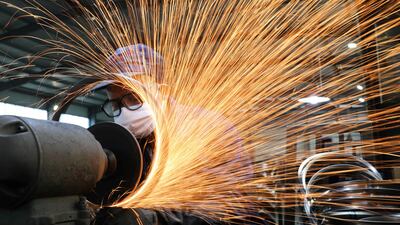Extended factory shutdowns in China to prevent the spread of the coronavirus led to production falling at the fastest rate on record, new purchasing managers' data shows.
The Caixin China General Manufacturing PMI index — a composite score measuring the health of the world's second largest economy's manufacturing sector — dropped to 40.3 in February, from 51.1 in January, signalling a "renewed decline in the health of the sector". A score above 50 indicates expansion and below 50 marks contraction.
The reading was at "the lowest level since the survey launched in early 2004", according to Zhengsheng Zhong, chairman and chief economist at CEBM Group.
Both the supply and demand side of the sector were "weak", Mr Zhong said, with output levels and new orders hitting record lows. A backlog of goods has developed as supply chains have become "stagnant", which has also caused problems with delivery times.
Despite this, the survey indicated that business confidence is improving. The gauge for future output expectations hit a five-year high as the government engaged in more proactive macroeconomic policies and targeted support towards small and medium-sized businesses.
"The economy will be able to see a significant rebound when the epidemic is gradually contained and companies accelerate the resumption of business,” Mr Zhong said.
Global growth could fall by 0.5 per cent this year to 2.4 per cent as a result of the coronavirus, the Organisation for Economic Cooperation and Development said in a report on Monday, on the assumption that the epidemic peaks in the first quarter.
China's economy could decelerate below 5 per cent this year before recovering to rise above 6 per cent in 2021, the Paris-based organisation said.
It said an adverse impact on confidence, financial markets, the travel sector and disruption to supply contributed to downward revisions for growth in all G20 economies, with those most strongly connected to China — Australia, Japan and South Korea — being hardest hit.
London-based Capital Economics said it expects China's GDP to drop by 2 per cent in the first quarter, but said the limited shutdowns in other countries means the impact should not be as severe. If more cases spring up in other countries that can't be traced, "it's possible that authorities may simply conclude the horse has bolted and there is little point in imposing widespread restrictions", chief economist Neil Shearing said in a note.
"At the benign end of the spectrum, in which most of the disruption is contained to China, we think the global economy may grow by about 2.5 per cent this year. That would be the weakest pace of expansion since 2009. At the other end of the spectrum, it’s possible that the global economy could shrink by 0.5 per cent this year — matching the scale of the contraction experienced during the 2008-09 global financial crisis," Mr Shearing said.


